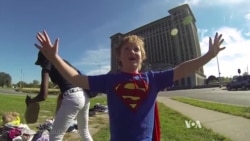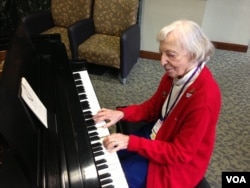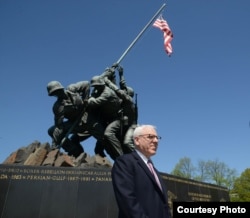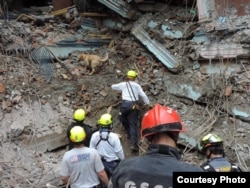2015 has had perhaps more than its share of tragedy, but there were also many displays of generosity and helpfulness. VOA was fortunate enough to meet a few people who are giving back to their communities. Here are the highlights.
The gift of music
Every Friday, you can find Cerlene Rose in the lobby of Sibley Hospital in Washington, playing the piano.
That's where VOA found her this past fall as she played some of her favorite tunes to a rapt audience.
It's a routine she began 20 years ago, as a way of dealing with grief over her husband's death. But what started out as therapy became something more. She found the joy of sharing her music with others not only therapeutic, but a lifesaver.
“I lost my husband in 1991 and for five years I was really at loose ends and started to get very depressed," she said. "And I thought, psychologically, if you help somebody else, you help yourself. And that's how I came to Sibley to play the piano.”
It's that spirit of giving, together with her musical talent, that has made Rose so popular, said Marianne Monek, director of Sibley's volunteer program.
“Her piano playing, her musical skills, it just brings so much joy to everyone, not only patients, not only family numbers, but staff," Monek said.
“It makes you feel warm and good inside, because you know you have done something worthwhile and you're helping someone else," said Rose. "And I think this is what life is all about.”
Hollywood at the White House
In 2014, President Barack Obama invited schoolchildren from all across the U.S. to create short films on “The Impact of Giving Back” and enter them into the second annual White House Student Film Festival. Young filmmakers responded enthusiastically, sending in more than 1,500 films.
Fifteen of those films were officially selected and screened this past March at a special event in the East Room of the White House, which VOA attended.
They included "Super Ewan," a film about 8-year-old Ewan Baker Drum from Detroit, Michigan, who dresses up like a superhero and distributes food, clothing and basic necessities to less fortunate members of his community.
And in the film “We Starts With Me,” a group of second-grade students at a school in Boulder, Colorado, explain how they would make the world a better place, with comments such as, "If we can help each other, things can start to change."
And then there was Archer Hadley, a high school student in Austin, Texas, who has cerebral palsy. When Hadley had a difficult time navigating the manually operated doors at his school because of his disability, it prompted him to raise money for automated doors at his school — not just for his benefit, but for anyone else who needs them.
“I got stuck out in the rain and that was the inspiration for my project," Hadley told VOA in front of the White House, adding, "I needed to raise $40,000 and I raised over $87,000.”
"Archer is giving back to his community by providing the ability for students and faculty and any visitor who comes to our school to feel welcome," said Nicole Griffith of Austin High School. "This project is going to help the community for years to come."
Patriotic philanthropy
When VOA met with successful businessman David Rubenstein in October, he explained that he wasn't always a wealthy man.
He grew up with "very, very modest means" in Baltimore, Maryland. But today, he's a billionaire.
He made his fortune as co-founder and co-chief executive of The Carlyle Group, a global private equity firm based in Washington.
Rubenstein feels very fortunate to have made it as a businessman, and feels the need to give back to a country he believes provided him with great opportunities.
As a result he has donated millions of dollars to help preserve American history by funding restoration projects for some of the country's most historic landmarks.
He calls it patriotic philanthropy.
“Philanthropy is an ancient Greek word that means 'loving humanity.' It doesn't mean rich people writing checks," he said. "So you can use whatever money you might have, but you can [also] use your time, your energy, your ideas to help your community, your state or your country.”
Canine dedication
Doing good work that helps others isn’t limited to humans.
When disaster strikes, anywhere in the world, American search-and-rescue dogs are among the first to arrive on the scene to help look for survivors.
In July, VOA traveled to Lorton, Virginia, to see how special canines like Pryse, a 6-year-old yellow Labrador retriever, are trained to do their job.
“They’re one of the best tools that we have to find unconscious people under the rubble,” said her trainer and best friend Ron Sanders.
Whether through music or film, or patriotic philanthropy, caring humans — and nonhumans — are using whatever talents and resources they have to help make the world a better place.








